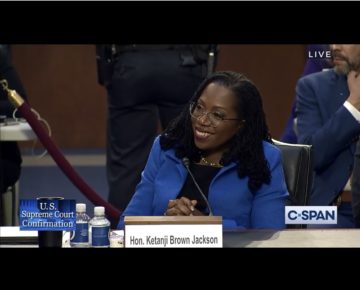by Michael Liss
Judge [Ketanji Brown] Jackson is an extraordinary person with an extraordinary American story[,] … [as well as] impeccable credentials and a deep knowledge of the law…, but I am unable to consent to the nomination. —Senator Ben Sasse (R-NE)
 At least Ben was polite about it. The rest of Judge Jackson’s hearing was absolutely awful. If you watched or read or otherwise dared approach the seething caldron of toxicity created by the law firm of Cotton, Cruz, Graham & Hawley (no fee unless a Democrat is smeared) you’ve probably had more than enough, so I’ll try to be brief before getting to more substantive matters.
At least Ben was polite about it. The rest of Judge Jackson’s hearing was absolutely awful. If you watched or read or otherwise dared approach the seething caldron of toxicity created by the law firm of Cotton, Cruz, Graham & Hawley (no fee unless a Democrat is smeared) you’ve probably had more than enough, so I’ll try to be brief before getting to more substantive matters.

First, as to KBJ’s chances, the jury is still out. Sasse’s fan dance means the Judiciary Committee will split 11-11, so a parliamentary maneuver will be required to move her nomination to a vote by the Senate as a whole. She just got Joe Manchin on board (leaving Sinema as the only possible Democratic holdout), and she might, maybe, get a vote or two from a Republican.
We should acknowledge that standing up and out of the latrine that Cotton & Co. just dug is a little difficult for many Republicans, even the ones who are about to retire. I mean, who could possibly say yes to a smut-peddling, criminal-coddling, CRT hugger who doesn’t even have a grasp of basic anatomy? The country should be grateful that Republicans finally were able to unearth the truth (having erroneously aided in confirming her to the federal bench twice before). Good grief. It wasn’t always like this. Read more »
